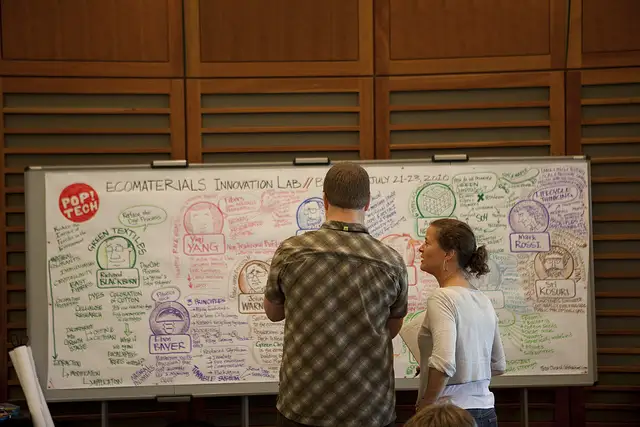20+ inspiring social innovation lab examples worldwide

Social innovation labs are increasingly popping up and evolving all over the world. They mostly focus on startups and business development around topics such as energy, environment, civic participation or the cities as a laboratories. For an introduction to social innovation read my blog post.
Most buzz is often about innovation labs focusing on startups (incubators and accelerators) often sponsored by venture capitalists or companies with a clear for-profit focus. But a lot is happening outside this scope focusing on people, society, challenges and how new technologies and new form of cooperation can result in change and impact. If you think that this is still at its beginning, you are most probably right, but the innovation lab landscape is changing quickly – just look at the Fablab movement or Google's recent venture, Sidewalk Lab.
Some thoughts I took out of this research:
- These social innovation labs are hosted and organized through very different actors such as civil society or businesses although most are run by governments. These innovation labs show that the traditional organizational and sectoral boundaries have become blurry--an important development towards systemic social innovation as they would not work in a traditional silo thinking.
- The same "tearing down boundaries" applies to the outcome of these labs: the projects, organizations and businesses. There are many experiments with different business models ranging from non- to for-profit or combining the two. Particularly for social enterprise a lot of creativity is needed to find sustainable business models.
- Another observation is that these innovation labs take very different types of participation focusing on small groups, whole neighbourhoods or specific segments with different methodologies. There are interesting learnings taking place to reach more impact through such labs, but it also raises many question on how these projects can be scaled in other locations. These and other questions are probably on the agenda of the upcoming innovation labs conference.
Lahore, Pakistan: Civic Innovation Lab
A civic innovation lab conformed mostly of volunteers who work in collaboration with government, non-profits and media. They work with technology, data, policy and design projects to strengthen their communities. Some of their projects are: Fuel Locator, an app to help people find fuel available in times of shortage; Social Story Telling App, an app to empower citizens to be heard--people can share their stories with the world and even find solutions together. Behind the initiative is the Codeforall network.
Jakarta, Indonesia: UN Global Pulse
They are a civic innovation lab driven by the United Nations focusing on projects using social media and other sources of data to address social development challenges, e.g. food and fuel prices, employment and urban poverty. The Pulse Lab work in cooperation with government, UN agencies, academia, private sector, and other international organizations to kick-start projects such as, "Translator Gator, a new language game to support research." The United Nationals Global Pulse has another lab in Kampala, Uganda.
South America: Socialab
Socialab is a whole Southern Latin American network around social innovation. They are an NGO whose aim is to tackle social challenges, such as poverty and inequality, and generate positive social impact through a socio-economic development model. Their main task is to support, fund and co-work with entrepreneurs who have ideas to solve social problems and have a social impact vision. Through their social innovation workshops and consulting, they put to good use work methodologies, lessons-learnt, and know-hows to actually achieve results.
Mexico City: Lab for the city
The Lab for the City is a hybrid (governmental and civic) innovation lab which facilitates collaboration and dialogue between citizens and government. They promote creativity and innovation in and out of government and are constantly prototyping and testing practices and ideas to adapt them to the needs of the city. Spanish website.
Chile: Laboratorio de Gobierno
Part of the Government of Chile, the Laboratorio de Gobierno is a civic innovation lab, which serves to build new relations between the government and citizens. They develop, facilitate and promote innovation processes in public services with an emphasis in citizens.
Innovation Lab Kosovo
As a civic innovation lab, it works on projects related to children and youth. With the use of information and technologies they "can analyze and understand the dynamics of need and service provision in ways never previously possible: we can uncover pockets of vulnerability, understand need in real time, and radically increase transparency and accountability."